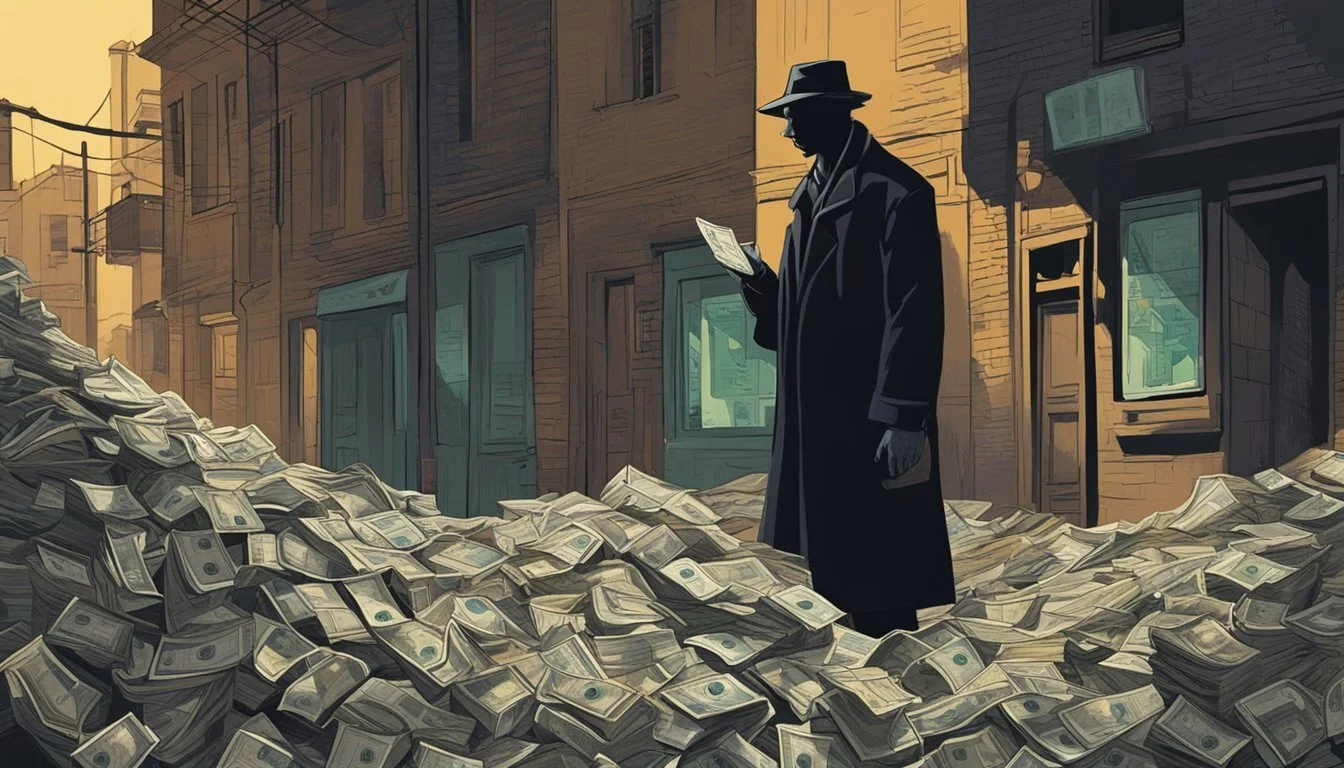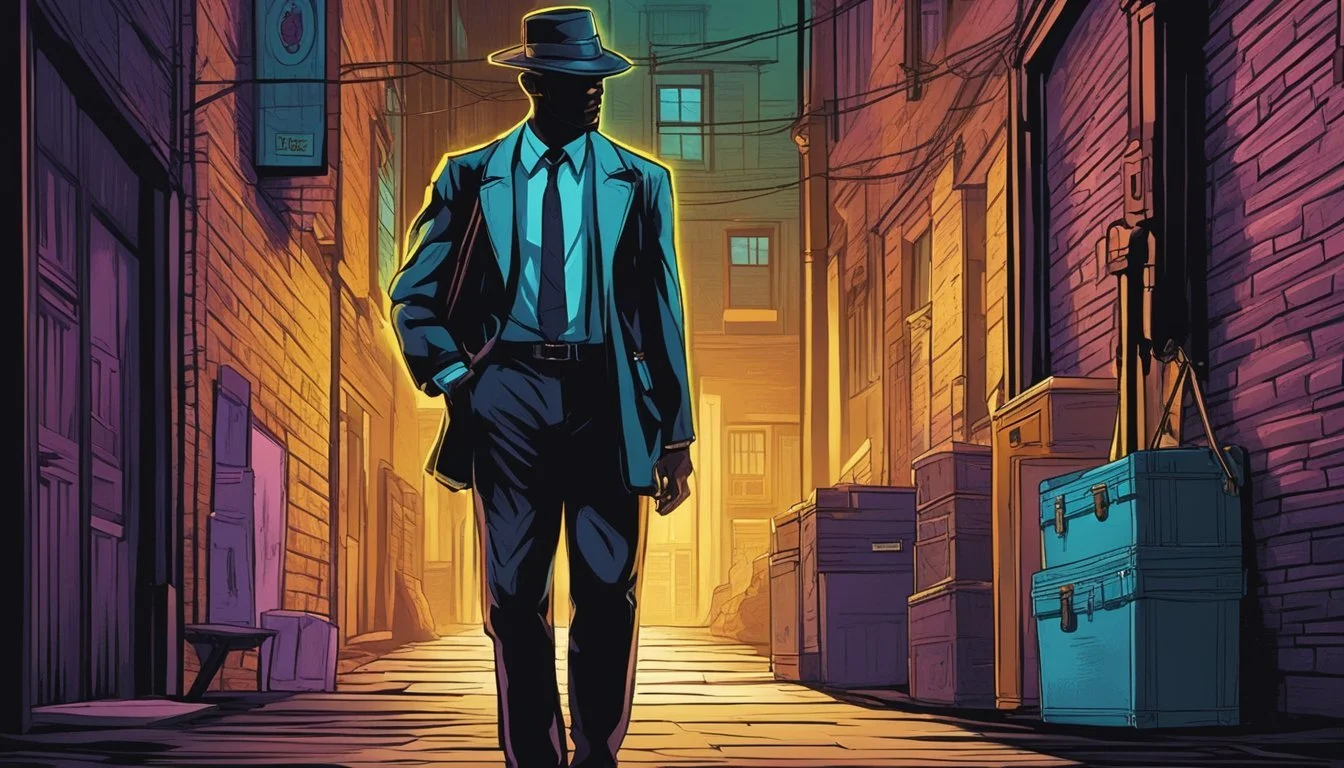The Opportunist: Con Artist Podcast Swindles Its Way to the Screen
Audio Series Adaptation Announced
True crime podcasts have captivated audiences with their gripping narratives of deceit and manipulation. Among these, "The Opportunist" stands out for its deep dives into the lives of scammers, con artists, and dangerous individuals who exploit others for personal gain. Hosted by Hannah Smith, the podcast uncovers the dark potentials that emerge when unscrupulous people seize the perfect moment to strike.
"The Opportunist" has gained such popularity that it's now making the leap from audio to visual medium, bringing its compelling stories to screens worldwide. This transition promises to enhance the storytelling experience, allowing viewers to see the faces behind the voices and visualize the intricate schemes that have captivated podcast listeners.
The show's success lies in its ability to blend narrative storytelling with factual reporting, creating an immersive experience that educates and entertains. By exposing the tactics of manipulators and fraudsters, "The Opportunist" serves as both a cautionary tale and a fascinating glimpse into the psychology of those who prey on others' trust and naivety.
History of 'The Opportunist'
'The Opportunist' podcast emerged as a captivating true crime series, quickly gaining recognition for its unique approach to storytelling. The show's journey from inception to popularity showcases its ability to engage listeners with tales of ordinary people who embrace sinister opportunities.
Origins and Creation
'The Opportunist' launched as a podcast series focusing on stories of regular individuals who turn to criminal activities. Created by Kast Media, the show debuted with host Hannah Smith at the helm. Smith's storytelling approach aimed to explore the dark potential lurking within seemingly normal people. The podcast's premise centered on examining how everyday individuals transform into thieves, scammers, or cult leaders.
The show's creators recognized a gap in the true crime genre. They sought to delve into cases that highlighted the fine line between ordinary life and criminal behavior. This unique angle set 'The Opportunist' apart from other true crime podcasts.
Rise in Popularity
'The Opportunist' quickly gained traction among true crime enthusiasts. Its success can be attributed to several factors:
Compelling storytelling
Diverse range of cases
In-depth exploration of motives
The podcast's popularity grew with each season, covering various intriguing cases. Notable episodes included the story of David Xu, an engineer who attempted to poison his coworker. Another season focused on Aubrey Lee Price, a respected community member involved in a shocking betrayal.
As of 2024, 'The Opportunist' has released over 160 episodes. The show's consistent quality and engaging content have solidified its place as a prominent true crime podcast. Its success has led to discussions about potential adaptations for other media platforms.
Plot Synopsis
"The Opportunist" podcast series explores true stories of ordinary individuals who turn to deception and criminality. Each episode delves into the motivations and circumstances that lead seemingly normal people to become con artists, scammers, or cult leaders.
Critical Themes
The podcast examines the psychology behind opportunistic behavior and the dark potential within everyday people. It highlights how certain individuals exploit vulnerabilities in others for personal gain. The series explores themes of manipulation, greed, and the blurred lines between right and wrong.
Trust and betrayal feature prominently, showcasing how con artists build relationships to further their schemes. The show also delves into the societal factors that enable such behavior to flourish.
Key Characters
Hannah Smith hosts the podcast, guiding listeners through each case with detailed narration. The series features a diverse cast of real-life characters, including:
Skilled manipulators who orchestrate elaborate scams
Charismatic cult leaders who exploit followers' trust
Ordinary people who stumble into criminal opportunities
Victims whose lives are upended by the opportunists' actions
Law enforcement officials and experts occasionally provide insights into the cases. The podcast also includes interviews with witnesses and sometimes even the perpetrators themselves, offering multi-faceted perspectives on each story.
Production and Development
The process of bringing "The Opportunist" podcast to the screen involved careful planning and execution. Key steps included conceptualizing the adaptation, making strategic casting choices, and implementing a focused filming approach.
Conceptualization
The transition from podcast to screen required thoughtful reimagining of "The Opportunist" format. Producers worked to maintain the essence of the original audio stories while enhancing them visually. They developed a narrative structure that blended reenactments with documentary-style interviews and archival footage.
The team outlined each episode to mirror the podcast's in-depth exploration of various con artists and scams. Visual storyboards were created to map out key scenes and transitions.
Casting Decisions
Casting directors faced the challenge of finding actors who could portray both the charisma and deception of notorious con artists. They sought performers with the ability to convey complex motivations and emotions.
For interview segments, producers reached out to original podcast sources when possible. This added authenticity to the production and provided continuity for fans of the podcast.
Some roles required actors to portray real individuals, while others were composite characters based on multiple accounts.
Filming and Direction
Directors employed a mix of filming techniques to capture the multifaceted nature of the stories. Reenactments were shot with a cinematic style to draw viewers into the con artists' worlds. Interview segments used a more straightforward documentary approach.
Location scouting played a crucial role in recreating the settings of various scams. When possible, filming took place in actual locations mentioned in the podcast.
The production team worked closely with the podcast creators to ensure accuracy and maintain the tone that made the original series compelling.
Impact and Reception
"The Opportunist" podcast quickly gained traction in the true crime genre, captivating listeners with its gripping narratives of con artists and scammers. Its transition to screen amplified its reach and influence across multiple media platforms.
Critical Response
Critics praised "The Opportunist" for its meticulous research and compelling storytelling. The podcast's ability to delve into the psychology of its subjects resonated with reviewers. Many lauded the show's balanced approach, presenting facts without sensationalism.
The screen adaptation received positive reviews for its visual interpretation of the podcast's content. Critics noted the seamless transition from audio to visual medium, highlighting the producers' attention to detail.
Several media outlets recognized "The Opportunist" with awards for outstanding true crime content. Its unique focus on opportunistic criminals set it apart in a crowded genre.
Audience Reception
"The Opportunist" amassed a dedicated fanbase, with listeners praising its in-depth exploration of complex cases. The podcast's engagement metrics soared, with high download numbers and positive ratings across platforms.
Fans appreciated the show's format, which combined narrative storytelling with archival audio. This approach brought cases to life, making them more accessible to audiences.
The screen adaptation further expanded the audience, attracting viewers who preferred visual content. Social media buzz increased, with fans sharing theories and discussing episodes online.
Cultural Influence
"The Opportunist" sparked conversations about white-collar crime and its societal impact. The podcast raised awareness of lesser-known scams, potentially helping listeners avoid similar situations.
Its success inspired a wave of similar podcasts and shows focusing on opportunistic criminals. "The Opportunist" became a reference point in true crime media, influencing content creators across the industry.
The podcast's exploration of human nature and motivation resonated beyond true crime enthusiasts. It prompted discussions on ethics, psychology, and the factors that drive individuals to exploit others for personal gain.
The Con Artist Phenomenon
Con artists exploit human psychology and societal dynamics to manipulate their victims. Their methods and motivations have long fascinated the public, leading to widespread representation in various forms of media.
Psychology of Swindling
Con artists often display traits of narcissism, psychopathy, and Machiavellianism. These characteristics enable them to charm and deceive without remorse. They excel at reading people and identifying vulnerabilities.
Greed plays a crucial role in both the con artist's motives and the victim's susceptibility. The promise of easy money or exclusive opportunities taps into people's desires for wealth and status.
Con artists use techniques like social proof, scarcity, and authority to gain trust and create urgency. They may present themselves as experts or align with respected institutions to boost credibility.
Representation in Media
Con artists have become staples in literature, film, and television. Characters like Jay Gatsby and Frank Abagnale Jr. capture public imagination with their audacious schemes.
True crime podcasts and documentaries delve into real-life swindles, satisfying audiences' curiosity about criminal minds. These stories often serve as cautionary tales while providing entertainment.
Media portrayals sometimes romanticize con artists, depicting them as charismatic antiheroes. This can inadvertently glamorize their actions and downplay the harm caused to victims.
Recent years have seen a surge in con artist-focused content, reflecting growing public interest in white-collar crime and financial deception.
Marketing and Promotion
The Opportunist podcast employs targeted advertising and a strong social media presence to attract listeners and build its audience. These strategies aim to increase brand awareness and engagement across multiple platforms.
Advertising Strategies
The Opportunist utilizes various advertising methods to reach potential listeners. Podcast networks and streaming platforms feature audio ads promoting upcoming episodes and highlighting intriguing case details. Cross-promotion with similar true crime and investigative podcasts helps tap into established audiences. The show also invests in targeted digital advertising on platforms like Google Ads and Spotify, using keywords related to true crime, scams, and con artists to attract interested listeners. Print and outdoor ads in major cities capture attention with provocative taglines teasing featured stories. These multi-channel efforts aim to maximize visibility and draw in new subscribers across different demographics.
Social Media Presence
Social media plays a crucial role in The Opportunist's marketing strategy. The podcast maintains active accounts on Twitter, Instagram, and Facebook, sharing teasers, behind-the-scenes content, and engaging directly with fans. Regular posts keep followers informed about new episodes and upcoming stories. The show encourages listener interaction through polls, Q&A sessions, and discussions about featured cases. User-generated content, such as fan theories and artwork, is often shared to foster community engagement. Collaborations with true crime influencers and relevant brands help expand the podcast's reach. The social media team also monitors trending topics to join relevant conversations, increasing visibility and attracting potential new listeners.
Behind-the-Scenes Insights
The journey of "The Opportunist" from podcast to screen involved numerous obstacles and triumphs. The production team faced unexpected hurdles while also achieving significant milestones along the way.
Challenges and Setbacks
Budget constraints posed a major challenge for the adaptation. The producers struggled to secure adequate funding for high-quality reenactments and archival footage licensing. This forced them to get creative with visual storytelling techniques.
Technical difficulties plagued early filming attempts. Audio issues and lighting problems caused delays and reshoots, stretching the production schedule. Some interview subjects became hesitant about appearing on camera, requiring last-minute replacements.
Legal concerns emerged regarding the portrayal of certain con artists still facing active investigations. The team had to carefully navigate these issues to avoid potential lawsuits while maintaining the show's integrity.
Triumphs and Successes
Despite the setbacks, the production team achieved several notable successes. They secured exclusive interviews with previously unheard victims, adding depth to the stories. This fresh perspective enhanced the show's emotional impact.
Innovative visual techniques were developed to overcome budget limitations. Creative use of animation and stylized reenactments helped bring the stories to life without breaking the bank.
The adaptation attracted high-profile talent. An award-winning director signed on to helm several episodes, bringing prestige and expertise to the project. This helped elevate the show's production values and storytelling quality.
Positive early feedback from test screenings boosted morale. Audiences praised the show's ability to translate the podcast's compelling narratives to a visual medium.
Screen Adaptation
The transition of "The Opportunist" from podcast to screen brings new dimensions to its compelling stories of con artists and scammers. This adaptation expands the reach of the original content while presenting unique challenges and opportunities.
Differences from the Original Podcast
The screen version of "The Opportunist" introduces visual elements that enhance storytelling. Dramatized reenactments bring key scenes to life, allowing viewers to see the con artists in action. Graphics and animations help explain complex schemes more clearly than audio alone.
The adaptation also features interviews with experts and victims, adding depth to the narratives. Pacing differs from the podcast, with episodes structured to fit television formats. Some stories are condensed, while others are expanded to fill entire episodes.
Visual cues and music create a tense atmosphere, amplifying the suspense present in the original audio format.
Reception of the Adaptation
Critics praise "The Opportunist" screen adaptation for its engaging visuals and ability to reach a broader audience. Fans of the podcast appreciate seeing familiar stories brought to life, though some miss the intimacy of audio-only storytelling.
The show garners positive reviews for its production values and attention to detail in recreating historical events. Some viewers find the visual format more accessible, especially for complex financial crimes.
Ratings indicate strong viewer engagement, with many praising the series' ability to educate while entertaining. Social media buzz suggests the adaptation is attracting new fans to the podcast's back catalog.
Conclusion
The Opportunist podcast's transition to television marks a significant milestone in true crime media. Its unique focus on con artists and white-collar criminals sets it apart in a crowded genre.
The show's success demonstrates the public's fascination with tales of deception and financial wrongdoing. By bringing these stories to life on screen, The Opportunist has the potential to reach an even wider audience.
As the series moves to television, it faces both opportunities and challenges. The visual medium allows for more immersive storytelling, but also requires careful adaptation of the podcast's signature narrative style.
The show's creators must balance entertainment with ethical reporting. Presenting complex financial crimes in an engaging way while respecting victims is a delicate task.
Ultimately, The Opportunist's TV adaptation represents the evolving landscape of true crime content. Its success could pave the way for more podcasts to make the leap to television, further blurring the lines between audio and visual storytelling.









